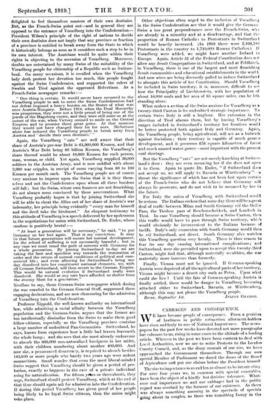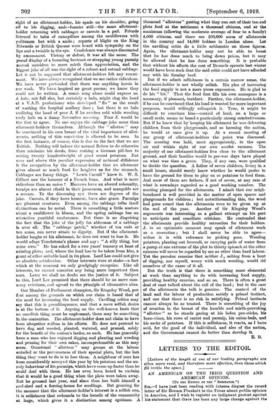CABBAGES AND CONSEQUENCE.
WE have become people of consequence. From a position of lowliness in public estimation allotment-holders have risen suddenly to one of National Importance. The news- papers for the past few weeks have devoted not mere paragraphs but columns to us, rising in some cases to the altitude of a loading article. Whereas in the past we have been content to deal with Locel Authorities, now we are to write Protests to the London County Council, and, as the dizzy summit of our rise, we have approached the Government themselves. Through our own special Member of Parlianient we dared the doors of the Board of Agriculture and put our claims before the President himself The rise to importance is so sudden as almost to be intoxicating. For over four years we, in common with special constables, have been the object of a kindly but derisive tolerance. What- ever real importance we and our cabbages had in the public regard was overlaid by the humour of our existence. As there was always something amusing in the spectacle of specials going about- in couples, so there was -something funny in the sight of an allotment-holder, his spade on his shoulder, going off to his digging, and—funnier still—the same allotment- holder returning with cabbages or carrots in a pail. Friends listened to tales of caterpillars among the cauliflowers with politeness but with a smile ; reports of blight on the King Edwards or British Queens were heard with sympathy on the lips and a twinkle in the eye. Condolence was always discounted by anuieement. Victory or defeat, it was all the same. The proud display of a bouncing beetroot or strapping young parsnip moved outsiders to more mirth than appreciation, and the biggest joke of all was the sight of a robust and rotund cabbage. Let it not be supposed that allotment-holders felt any resent- ment. We have always recognized that we are rather ridiculous. We have never pretended that there was anything heroic in our work. We have inspired no great poems; we know they could not be written. A comic song alone could express us. A halo, not full size, but certainly a halo, might ring the head of a V.A.D. probationer who developed " flu " as the result of washing the hospital scullery floor ; but there is no halo outlining the head of poor J. if he catches cold while weeding curly kale on a damp November moaning. Poor J. would be the first to agree. No one enjoys the cabbage joke more than allotment-holders themselves. Although the " allottee " may be convinced in his own breast of the vital importance of allot- ments, nothing of this conviction is allowed to be seen. In the first instance, of course, this is due to the fact that we are British. Nothing will induce the normal Briton to do otherwise than minimize his deeds, from rushing a German pill-box to raising twenty hundredweight of good sound potatoes. But over and above this peculiar expression of national diffidence is the recognition by the allotment-bolder that an allotment gives almost as much food for laughter as for the stomach. Cabbages are funny things. " Lewis Carroll " knew it. W. S. Gilbert saw the humour of a French bean. And what is more ridiculous than an onion ? Marrows have an absurd solemnity, turnips are almost ribald in their jocoseness, and mangolds are a scream. To the discerning eye there are degrees of the joke. Carrots, if they have humour, have also grace, Parsnips are pleasant creatures. Even among the cabbage tribe itself distinctions can be noted. There is something a little austere about a cauliflower in bloom, and the spring cabbage has an attractive youthful exuberance. But there is no disguising the fact that the joke of the jolly fat alderman of a cabbage Is over all. The " cabbage patch," whether of ten rods or ten acres, can never attain to dignity. But if the allotment- holder laughs at his allotment, he does not want to lose it. He would adapt Touchstone's pbzaae and say : " A silly thing, but mine own." He has asked for a two years' tenancy at least of existing plots; and, where the land has to be taken from him, a grant of other suitable land in its place. Lord Lee could not give us absolute satisfaction. Other interests were at stake—a fact which at the moment we only grudgingly recognize. Like all interests, we cannot conceive any being more important than ours. Later we shall no doubt see the justice of it, Subject to this, Lord Lee promised that there should be no more sine- wary evictions, and agreed to the painciple of alternative sites.
Our Member of.Parliament champion, Sir Kingsley Wood, put first among the grounds on which our • claim is based that of the need for increasing the food supply. Cavilling critics may say that this is grandiloquence, and that a mere selfish desire is at the bottom of it. Arguing on the well-known basis that an unselfish thing must be unpleasant, there may be something in, the contention. The allotment-holder-doe not claim to have been altogether selfless in his efforts. He does not-pretend to have dug and weeded, planted, watered, and pruned, solely for the benefit of the nations larder, as such. He has generally been a man who has enjoyed digging and planting and weeding and prening for their own sakes, incomprehensible as this may seem. Occasional allottees " may grouse at the labour entailed or the perverseness of their special plots, but the last thing they want to do is to lose them. A neighbour of ours has been considerably annoyed this year by his potatoes and the un- ruly behaviour of his parsnips, which; have come up faster than he could deal with them. He has even been heard to exclaim that it would be a good thing when the plots were taken away. But be groused last year, and since then has built himself a tool-shed and a forcing-house for seedlings. But granting for the moment that the allotment-holder's interest is a selfish one, it is selfishness that redounds to the benefit of the community at large, which gives it a distinction among egotiams. A
thousand "ellottees" getting what they can out of their ten-rod plots feed at the minimum a thousand citizens, and at the maximum (allowing the moderate average of four to a family) 4,000 citizens, and there are 250,000 acres of allotments in the country and 14,000 holders in London alone. Let the cavilling critic do a little arithmetic on those figures. Again, the allotment-holder may not be able to boast that he has done much to bring down prices, but it may be allowed that he has done something. It is probable that without his efforts the cost of Brussels sprouts last winter would have been such that the said critic could not have afforded any with his Sunday beef. -
But if we admit selfishness in a certain, narrow sense, the allotment-holder is not wholly selfish. His plea of increasing the food supply is not a mere pious expression. He is glad to do his " bit." That the food first fills his own saucepans is a necessary, if pleasant, incident. Further, the allotment-holder, if he can be convinced that his land is wanted for more important purposes, would willingly relinquish it. True, it might be difficult to convince him—control of land, on a large or small scale, seems to breed a particularly strong combativeness. But if he knew that by keeping his allotment he was debarring children from their playgrounds, and so harming the nation, he would at once give it up. At a recent meeting of our group of allotment-holders the point was discussed. The meeting was held, most appropriately, in the open air and within sight of our own scarlet runners. The majority of our allotment-holders live close to the allotment ground, and their families would in pre-war days have played on what was then a green. They, if any one, were qualified to decide the question. A father of seven children, living in a small house, should surely know whether he would prefer to have the ground for them to play on or potatoes to feed them. And most of them are fathers, if not of seven, at any rate of what is nowadays regarded as a good working number. The meeting plumped for the allotments. I admit that our neigh- beurimod is well provided in the matter of open spaces and playgrounds for children ; but notwithstanding this, the word had gene round that the allotments were to be given up at the end of the year. Another of Sir Kingsley Wood's arguments was interesting as a gallant attempt on his part to anticipate and conciliate criticism. He contended that the allotments provide healthy recreation for their holders. J. in an optimistic moment may speak of allotment work as a, recreation ; but I shall never be able to agree— unless it is with reference to picking peas. Weeding potatoes, planting out broccoli, or carrying pails of water from a pinup at one extreme of the plot to thirsty spinach at the other extreme will never be regarded lay me as other than hard labour. Yet the paradox remains that neither J., aching from a bout of digging, nor myself, weary with much weeding, would rid ourselves of the cause of it all.
But the truth is that there -is something more elemental at work than anything to do with increasing food supply providing healthy exercise, and so on. There is often a great deal of cant talked about the call of the land ; but in the case of the allotments the talk is genuine. The control of the lend and, the labour of production satisfy a primal instinct, and one that there is no risk in satisfying. Primal instincts cannot always be so trusted. There is something of the joy of creation in the breast of the humble and mirth-provoking " allottee " as he stands gazing at his laden pea-sticks, his bean-vines, his rows of carrot and parsnip, his onion-beds, and his sacks of potatoes. If this is selfishness, it reacts, as I have said, for the good of the individual, and also of the nation, and the Government cannot do better than develqp it.
N. B.



































 Previous page
Previous page